| Srl | Item |
| 1 |
ID:
104675
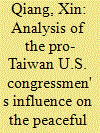

|
|
|
| 2 |
ID:
062197
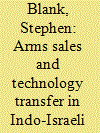

|
|
|
|
|
| Publication |
Spring/Summer 2005.
|
|
|
|
|
|
|
|
|
|
|
|
|
|
|
|
| 3 |
ID:
185268
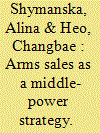

|
|
|
|
|
| Summary/Abstract |
This article examines Israel’s sales of advanced arms and technology as a middle-power foreign policy tool. By way of doing so it discusses the nature and characteristics of this policy, as well as its various components, and assesses the extent of its success in achieving its goals. It concludes that despite Washington’s occasional opposition to its arms export policies, Israel’s strategy has proved highly successful and can serve as a model for middle powers seeking to improve their status and prestige in the contemporary international system.
|
|
|
|
|
|
|
|
|
|
|
|
|
|
|
|
| 4 |
ID:
101893
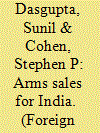

|
|
|
|
|
| Publication |
2011.
|
| Summary/Abstract |
With India planning to buy $100 billion worth of new weapons over the next ten years, arms sales may be the best way to revive Washington's relationship with New Delhi, its most important strategic partner in the region.
|
|
|
|
|
|
|
|
|
|
|
|
|
|
|
|
| 5 |
ID:
185298
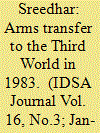

|
|
|
| 6 |
ID:
057346
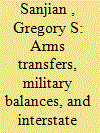

|
|
|
| 7 |
ID:
062688
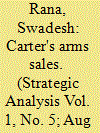

|
|
|
| 8 |
ID:
120699
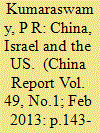

|
|
|
|
|
| Publication |
2013.
|
| Summary/Abstract |
Since the normalisation of relations in January 1992, Israel has been unable to pursue its military relations with China as before. This was primarily due to American pressures and its perception of China as its new strategic threat. Given its limited political options, arms sales and other forms of security assistance function as Israel's principal instrument of promoting its foreign policy interests. The weakening of American economic power and hence political influence, emergence of China as the second-largest economy in the world and China's growing strategic relations with the Middle East is likely to result in Israel re-examining its no-arms policy towards China.
|
|
|
|
|
|
|
|
|
|
|
|
|
|
|
|
| 9 |
ID:
100248
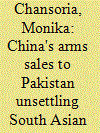

|
|
|
| 10 |
ID:
121904
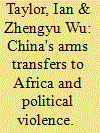

|
|
|
|
|
| Publication |
2013.
|
| Summary/Abstract |
Chinese arms sales to Africa have increased in recent years. In a region beset by conflict and unstable regimes, and where arms sales are a significant and positive predictor of an increased probability of political violence, this is inherently problematic. The sale of weaponry to a regime in Khartoum caught up in an alleged "genocide" in Darfur, the awkward appearance in 2008 of a Chinese ship loaded with weapons bound for Mugabe's Zimbabwe off the coast of eastern Africa, and the recent exposure in 2011 that Chinese arms companies offered to sell around $200 million worth of arms to Muammar Gaddafi's regime are emblematic of an issue in Africa's political violence that needs analysis. This article seeks to discuss the rationale behind China's arms sales to Africa and the effect that they have had on political violence in recipient countries. It also provides an analysis of the supply-and-demand circumstances of Chinese arms transfers to Africa, Beijing's attempts to control such transfers, and evidence that Chinese policies on proliferation are (slowly) evolving.
|
|
|
|
|
|
|
|
|
|
|
|
|
|
|
|
| 11 |
ID:
116370
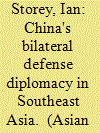

|
|
|
|
|
| Publication |
2012.
|
| Summary/Abstract |
Consonant with global trends, China's defense diplomacy has broadened in the pursuit of new foreign policy and security goals. While realpolitik still informs China's military relations with Southeast Asian countries, Beijing has also utilized defense diplomacy to build cooperative relations, underscore its "peaceful development" thesis, increase transparency, and assuage regional anxieties concerning its rising power. Over the past decade, China has stepped up arms sales to the region, military exchanges and naval ship visits, initiated annual defense and security dialogues, and combined training and exercises. However, China's defense diplomacy in Southeast Asia still faces barriers, including tensions generated by sovereignty disputes in the South China Sea, the poor reputation of Chinese weapon systems, and second-order impacts on Southeast Asian countries' existing defense relationships.
|
|
|
|
|
|
|
|
|
|
|
|
|
|
|
|
| 12 |
ID:
123578
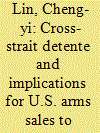

|
|
|
| 13 |
ID:
110518


|
|
|
|
|
| Publication |
2011.
|
| Summary/Abstract |
This article argues that the European Union has more interests in the People's Liberation Army Navy modernisation and maritime security issues in East Asia than has traditionally been recognised. The PRC's naval modernisation intersects with the EU's foreign and security policy interests in five main areas: the international Law of the Sea; the risks for Europe of being dragged into an Asian maritime conflict and the safety of European trade with Asian partners; Europe's competitiveness in international markets for naval military systems; the potential for maritime security cooperation against non-traditional threats; and finally, the arms embargo issue and the question of naval technology transfers to China. Through an assessment of the current PLAN modernisation - and Europe's significant contribution to this effort - the article argues that European policy towards China doesn't adequately address these five policy areas.
|
|
|
|
|
|
|
|
|
|
|
|
|
|
|
|
| 14 |
ID:
079728
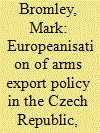

|
|
|
|
|
| Publication |
2007.
|
| Summary/Abstract |
This article examines changes in the level of transparency and the outcomes of arms export policies in the Czech Republic, Poland, and Slovakia since they joined the EU in May 2004, and determines the extent to which these changes are attributable to the 'Europeanisation' of this policy area. Following the approach of the existing literature, this article views the Europeanisation of EU arms export policy as the process by which certain key policy structures and decision-making processes become increasingly subject to systems of multi-level governance. The article finds that while Europeanisation has led to an increase in arms export policy transparency, its impact on arms export policy outcomes is harder to detect. At most, Europeanisation has been one of a range of factors driving change in this area
|
|
|
|
|
|
|
|
|
|
|
|
|
|
|
|
| 15 |
ID:
137509


|
|
|
|
|
| Summary/Abstract |
Russia views its military exports as a major tool for achieving its national security interests, particularly, in the East Asia and the Middle East. The arms trade is an integral part of its image as a world power, a critical part of its relationship with other states in Asia, a central element in its defense and security agreements, and an essential component of its ability to obtain and maintain access to influence and resources in regions of interest. So, while it is true that Russia does sell arms and military equipment to generate revenue and extend production runs for its defense industry, it is erroneous to claim that this in the central driver behind Russia’s arms trade. Russia seeks to maintain and expand its status as a world power, and views the focused, purposeful export of its military technologies to key countries as a fundamental tool in achieving this.
|
|
|
|
|
|
|
|
|
|
|
|
|
|
|
|
| 16 |
ID:
181023
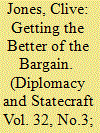

|
|
|
|
|
| Summary/Abstract |
This analysis explores the nature of Anglo-Israeli intelligence relations between 1967 and 1974, focusing in particular on how the legacy of the British mandate in Palestine, the influence of senior British diplomats, as well as wider commercial interests shaped attempts by intelligence officials on both sides to move this relationship beyond the purely functional. Whilst Israel looked to barter access to recently captured Soviet equipment for greater collaboration with the British in weapons development and arms sales, London demurred. Despite the urging of some in Whitehall, the Foreign and Commonwealth Office limited any collaboration to functional exchanges and kept them firmly in the shadows. The aftermath of the October 1973 war revealed the price paid by Britain. With Israel now dependent on Washington for the bulk of its military equipment, London’s ability to exercise any influence over Tel Aviv in reaching an accommodation with its Arab neighbours diminished greatly.
|
|
|
|
|
|
|
|
|
|
|
|
|
|
|
|
| 17 |
ID:
131623
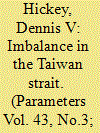

|
|
|
| 18 |
ID:
111898
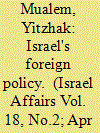

|
|
|
|
|
| Publication |
2012.
|
| Summary/Abstract |
Arms sales are a prominent issue in Israeli foreign policy. This subject has influenced the history of the state in the international arena. Arms sales serve two main goals: economic improvement, and a means for shaping the domestic policy of the recipient state. The government of Israel has acted to improve its relations with the recipient countries in the political and strategic areas in the framework of its foreign aid to those countries. Yet it has acted to change the policy in those countries - Ethiopia, Argentina and Iran - pertaining to their indigenous Jewish communities.
|
|
|
|
|
|
|
|
|
|
|
|
|
|
|
|
| 19 |
ID:
107366
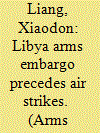

|
|
|
|
|
| Publication |
2011.
|
| Summary/Abstract |
Members of a UN-authorized coalition began air strikes March 19 against military assets controlled by Libyan leader Moammar Gaddafi, completing an abrupt reversal in relations that until as recently as three months ago involved significant arms sales. With an arms embargo mandated by UN Security Council Resolution 1970 in place since Feb. 26, key coalition members such as France, the United Kingdom, and the United States are now committed to preventing the further influx of weapons to Gaddafi's forces.
|
|
|
|
|
|
|
|
|
|
|
|
|
|
|
|
| 20 |
ID:
124076
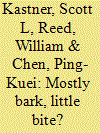

|
|
|